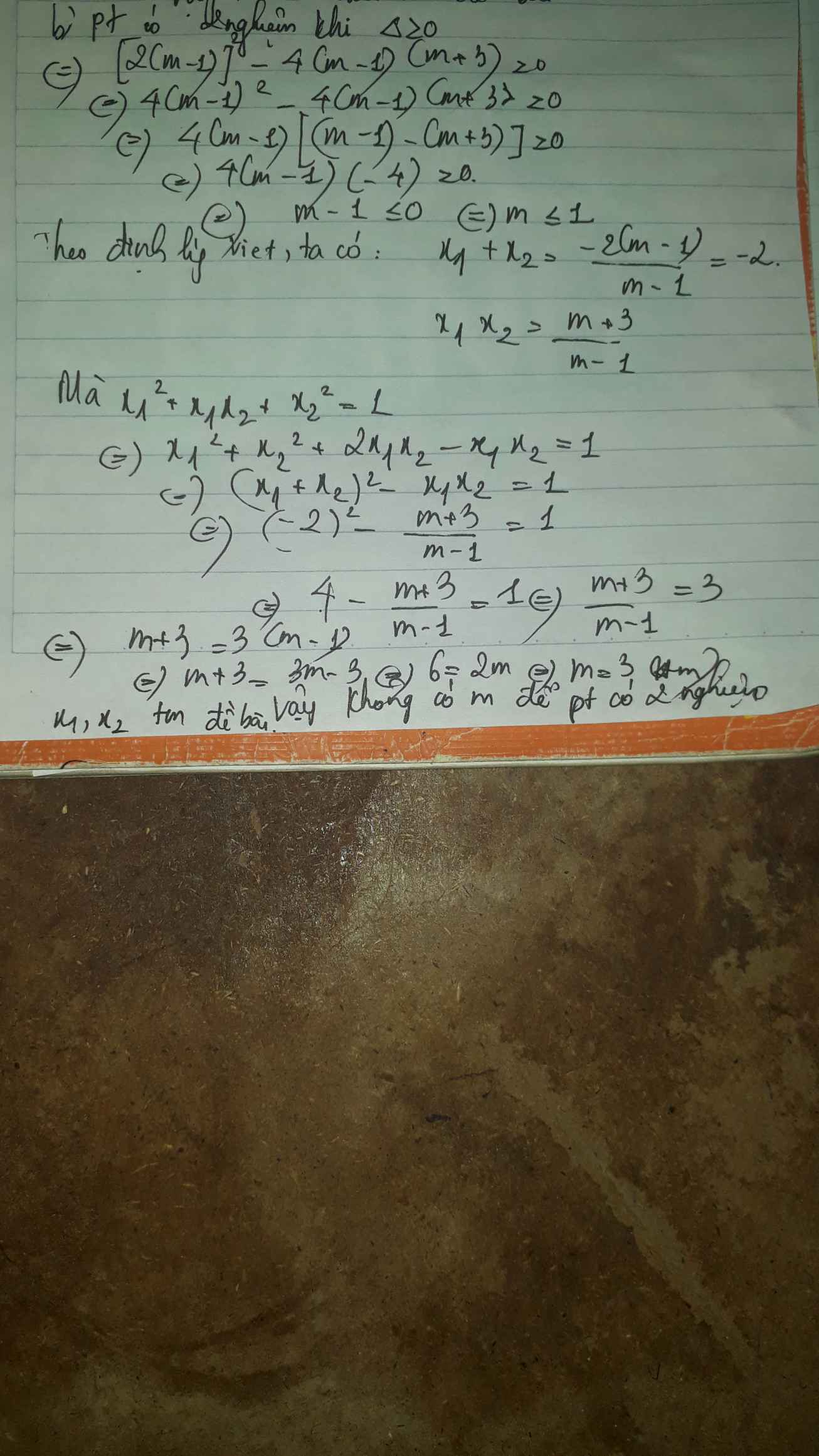Hãy nhập câu hỏi của bạn vào đây, nếu là tài khoản VIP, bạn sẽ được ưu tiên trả lời.

Xét \(\Delta=4\left(m-1\right)^2-4.\left(-3\right)=4\left(m-1\right)^2+12>0\forall m\)
=>Pt luôn có hai nghiệm pb
Theo viet:\(\left\{{}\begin{matrix}x_1+x_2=2\left(m-1\right)\\x_1.x_2=-3\ne0\forall m\end{matrix}\right.\)
Có \(\dfrac{x_1}{x_2^2}+\dfrac{x_2}{x_1^2}=m-1\)
\(\Leftrightarrow x_1^3+x_2^3=\left(m-1\right)x_1^2.x_2^2\)
\(\Leftrightarrow\left(x_1+x_2\right)^3-3x_1x_2\left(x_1+x_2\right)=\left(m-1\right).\left(-3\right)^2\)
\(\Leftrightarrow8\left(m-1\right)^3-3\left(-3\right).2\left(m-1\right)=9\left(m-1\right)\)
\(\Leftrightarrow8\left(m-1\right)^3+9\left(m-1\right)=0\)
\(\Leftrightarrow\left(m-1\right)\left[8\left(m-1\right)^2+9\right]=0\)
\(\Leftrightarrow m=1\)(do \(8\left(m-1\right)^2+9>0\) với mọi m)
Vậy m=1
Vì \(ac< 0\) \(\Rightarrow\) Phương trình luôn có 2 nghiệm phân biệt
Theo Vi-ét, ta có: \(\left\{{}\begin{matrix}x_1+x_2=2m-2\\x_1x_2=-3\end{matrix}\right.\)
Mặt khác: \(\dfrac{x_1}{x_2^2}+\dfrac{x_2}{x_1^2}=m-1\) \(\Rightarrow\dfrac{\left(x_1+x_2\right)\left(x_1^2+x_2^2-x_1x_2\right)}{x_1^2x_2^2}=m-1\)
\(\Leftrightarrow\dfrac{\left(x_1+x_2\right)\left[\left(x_1+x_2\right)^2-3x_1x_2\right]}{x_1^2x_2^2}=m-1\)
\(\Rightarrow\dfrac{\left(2m-2\right)\left(4m^2-8m+13\right)}{9}=m-1\)
\(\Leftrightarrow...\)

Lời giải:
Để pt có 2 nghiệm thì: $\Delta=25-4(m-2)\geq 0$
$\Leftrightarrow m\leq \frac{33}{4}$
Áp dụng hệ thức Viet, với $x_1,x_2$ là 2 nghiệm của pt thì:
$x_1+x_2=-5$
$x_1x_2=m-2$
Khi đó:
$\frac{1}{x_1-1}+\frac{1}{x_2-1}=2$
$\Leftrightarrow \frac{x_1+x_2-2}{(x_1-1)(x_2-1)}=2$
$\Leftrightarrow \frac{-5-2}{(x_1-1)(x_2-1)}=2$
$\Leftrightarrow (x_1-1)(x_2-1)=\frac{-7}{2}$
$\Leftrightarrow x_1x_2-(x_1+x_2)+1=\frac{-7}{2}$
$\Leftrightarrow m-2+5+1=\frac{-7}{2}$
$\Leftrightarrow m=\frac{-15}{2}$ (tm)
Lời giải:
Để pt có 2 nghiệm thì: $\Delta=25-4(m-2)\geq 0$
$\Leftrightarrow m\leq \frac{33}{4}$
Áp dụng hệ thức Viet, với $x_1,x_2$ là 2 nghiệm của pt thì:
$x_1+x_2=-5$
$x_1x_2=m-2$
Khi đó:
$\frac{1}{x_1-1}+\frac{1}{x_2-1}=2$
$\Leftrightarrow \frac{x_1+x_2-2}{(x_1-1)(x_2-1)}=2$
$\Leftrightarrow \frac{-5-2}{(x_1-1)(x_2-1)}=2$
$\Leftrightarrow (x_1-1)(x_2-1)=\frac{-7}{2}$
$\Leftrightarrow x_1x_2-(x_1+x_2)+1=\frac{-7}{2}$
$\Leftrightarrow m-2+5+1=\frac{-7}{2}$
$\Leftrightarrow m=\frac{-15}{2}$ (tm)

a) Với m = 2, phương trình đã cho trở thành:
2x² - 6x + 2.2 - 5 = 0
⇔ 2x² - 6x - 1 = 0
∆' = (-3)² - 2.(-1) = 11 > 0
⇒ Phương trình có 2 nghiệm phân biệt:
x₁ = [-(-3) + 11]/2 = (3 + 11)/2
x₂ = [-(-3) - 11]/2 = (3 - 11)/2
b) ∆' = (-3)² - 2.(2m - 5)
= 9 - 4m + 10
= 19 - 4m
Để phương trình đã cho có nghiệm thì ∆' ≥ 0
⇔ 19 - 4m ≥ 0
⇔ 4m ≤ 19
⇔ m ≤ 19/4
Theo định lý Viét, ta có:
x₁ + x₂ = 3
x₁x₂ = (2m - 5)/2
Ta có:
1/x₁ + 1/x₂ = 6
⇔ (x₁ + x₂)/(x₁x₂) = 6
⇔ 3/[(2m - 5)/2] = 6
⇔ (2m - 5)/2 = 1/2
⇔ 2m - 5 = 1
⇔ 2m = 6
⇔ m = 3 (nhận)
Vậy m = 3 thì phương trình đã cho có 2 nghiệm thỏa mãn yêu cầu

a: Khi m = -4 thì:
\(x^2-5x+\left(-4\right)-2=0\)
\(\Leftrightarrow x^2-5x-6=0\)
\(\Delta=\left(-5\right)^2-5\cdot1\cdot\left(-6\right)=49\Rightarrow\sqrt{\Delta}=\sqrt{49}=7>0\)
Pt có 2 nghiệm phân biệt:
\(x_1=\dfrac{5+7}{2}=6;x_2=\dfrac{5-7}{2}=-1\)

Ta có: \(\Delta=\left[-2\left(m-1\right)\right]^2-4\cdot1\cdot\left(m+1\right)\)
\(=\left(-2m+2\right)^2-4\left(m+1\right)\)
\(=4m^2-8m+4-4m-4\)
\(=4m^2-12m\)
Để phương trình có nghiệm thì \(\text{Δ}\ge0\)
\(\Leftrightarrow4m^2-12m\ge0\)
\(\Leftrightarrow4m\left(m-3\right)\ge0\)
\(\Leftrightarrow m\left(m-3\right)\ge0\)
\(\Leftrightarrow\left[{}\begin{matrix}m\ge3\\m\le0\end{matrix}\right.\)
Khi \(\left[{}\begin{matrix}m\ge3\\m\le0\end{matrix}\right.\), Áp dụng hệ thức Vi-et, ta có:
\(\left\{{}\begin{matrix}x_1+x_2=2\left(m-1\right)=2m-2\\x_1\cdot x_2=m+1\end{matrix}\right.\)
Ta có: \(\dfrac{x_1}{x_2}+\dfrac{x_2}{x_1}=4\)
\(\Leftrightarrow\dfrac{x_1^2+x_2^2}{x_1\cdot x_2}=4\)
\(\Leftrightarrow\dfrac{\left(x_1+x_2\right)^2-2x_1x_2}{x_1x_2}=4\)
\(\Leftrightarrow\dfrac{\left(2m-2\right)^2-2\cdot\left(m+1\right)}{m+1}=4\)
\(\Leftrightarrow4m^2-8m+4-2m-2=4\left(m+1\right)\)
\(\Leftrightarrow4m^2-10m+2-4m-4=0\)
\(\Leftrightarrow4m^2-14m-2=0\)
Đến đây bạn tự làm nhé, chỉ cần tìm m và đối chiều với điều kiện thôi
Pt có 2 nghiệm
\(\to \Delta=[-2(m-1)]^2-4.1.(m+1)=4m^2-8m+4-4m-4=4m^2-12m\ge 0\)
\(\leftrightarrow m^2-3m\ge 0\)
\(\leftrightarrow m(m-3)\ge 0\)
\(\leftrightarrow \begin{cases}m\ge 0\\m-3\ge 0\end{cases}\quad or\quad \begin{cases}m\le 0\\m-3\le 0\end{cases}\)
\(\leftrightarrow m\ge 3\quad or\quad m\le 0\)
Theo Viét
\(\begin{cases}x_1+x_2=2(m-1)\\x_1x_2=m+1\end{cases}\)
\(\dfrac{x_1}{x_2}+\dfrac{x_2}{x_1}=4\)
\(\leftrightarrow \dfrac{x_1^2+x_2^2}{x_1x_2}=4\)
\(\leftrightarrow \dfrac{(x_1+x_2)^2-2x_1x_2}{x_1x_2}=4\)
\(\leftrightarrow \dfrac{[2(m-1)]^2-2.(m+1)}{m+1}=4\)
\(\leftrightarrow 4m^2-8m+4-2m-2=4(m+1)\)
\(\leftrightarrow 4m^2-10m+2-4m-4=0\)
\(\leftrightarrow 4m^2-14m-2=0\)
\(\leftrightarrow 2m^2-7m-1=0 (*)\)
\(\Delta_{*}=(-7)^2-4.2.(-1)=49+8=57>0\)
\(\to\) Pt (*) có 2 nghiệm phân biệt
\(m_1=\dfrac{7+\sqrt{57}}{2}(TM)\)
\(m_2=\dfrac{7-\sqrt{57}}{2}(TM)\)
Vậy \(m=\dfrac{7\pm \sqrt{57}}{2}\) thỏa mãn hệ thức

Theo Vi et \(\left\{{}\begin{matrix}x_1+x_2=2\left(m-4\right)\\x_1x_2=-m^2+4\end{matrix}\right.\)
\(\dfrac{x_1+x_2}{x_1x_2}+\dfrac{4}{x_1x_2}=1\)
Thay vào ta được : \(\dfrac{2\left(m-4\right)+4}{-m^2+4}=1\Leftrightarrow\dfrac{2m-4}{\left(2-m\right)\left(m+2\right)}=1\Leftrightarrow\dfrac{-2}{m+2}=1\Rightarrow-2=m+2\Leftrightarrow m=-4\)

ĐK:`x_1,x_2 ne 0=>x_1.x_2 ne 0`
`=>-2m-1 ne 0=>m ne -1/2`
Ta có:`a=1,b=2m,c=-2m-1`
`=>a+b+c=1+2m-2m-1=0`
`<=>` \(\left[ \begin{array}{l}x=1\\x=-2m-1\end{array} \right.\)
PT có 2 nghiệm pn
`=>-2m-1 ne 1`
`=>-2m ne 2`
`=>m ne -1`
Nếu `x_1=1,x_2=-2m-1`
`pt<=>6=1+1/(-2m-1)`
`<=>5=1/(-2m-1)`
`<=>2m+1=-1/5`
`<=>2m=-6/5`
`<=>m=-3/5(tm)`
Nếu `x_2=1,x_1=-2m-1`
`pt<=>6/(-2m-1)=-2m-1+1=-2m`
`<=>6/(2m+1)=2m`
`<=>3/(2m+1)=m`
`<=>2m^2+m-3=0`
`a+b+c=0`
`=>m_1=1(tm),m_2=-c/a=-3/2(tm)`
Vậy `m in {-3/5,1,-3/2}` thì ....

Có\(\Delta=4\left(m+1\right)^2-4\left(2m-3\right)=4m^2+16>0\forall m\)
=> pt luôn có hai nghiệm pb
Theo viet có: \(\left\{{}\begin{matrix}x_1+x_2=2\left(m+1\right)\\x_1x_2=2m-3\end{matrix}\right.\)
Có :\(P^2=\left(\dfrac{x_1+x_2}{x_1-x_2}\right)^2=\dfrac{4\left(m+1\right)^2}{\left(x_1+x_2\right)^2-4x_1x_2}\)
\(=\dfrac{4\left(m+1\right)^2}{4\left(m+1\right)^2-4\left(2m-3\right)}=\dfrac{4\left(m+1\right)^2}{4m^2+16}\)\(\ge0\)
\(\Rightarrow P\ge0\)
Dấu = xảy ra khi m=-1

b) phương trình có 2 nghiệm \(\Leftrightarrow\Delta'\ge0\)
\(\Leftrightarrow\left(m-1\right)^2-\left(m-1\right)\left(m+3\right)\ge0\)
\(\Leftrightarrow m^2-2m+1-m^2-3m+m+3\ge0\)
\(\Leftrightarrow-4m+4\ge0\)
\(\Leftrightarrow m\le1\)
Ta có: \(x_1^2+x_1x_2+x_2^2=1\)
\(\Leftrightarrow\left(x_1+x_2\right)^2-2x_1x_2=1\)
Theo viet: \(\left\{{}\begin{matrix}x_1+x_2=-\dfrac{b}{a}=2\left(m-1\right)\\x_1x_2=\dfrac{c}{a}=m+3\end{matrix}\right.\)
\(\Leftrightarrow\left[-2\left(m-1\right)^2\right]-2\left(m+3\right)=1\)
\(\Leftrightarrow4m^2-8m+4-2m-6-1=0\)
\(\Leftrightarrow4m^2-10m-3=0\)
\(\Leftrightarrow\left[{}\begin{matrix}m_1=\dfrac{5+\sqrt{37}}{4}\left(ktm\right)\\m_2=\dfrac{5-\sqrt{37}}{4}\left(tm\right)\end{matrix}\right.\Rightarrow m=\dfrac{5-\sqrt{37}}{4}\)

Phương trình có nghiệm \(\Leftrightarrow\Delta'\ge0\Leftrightarrow1-m\ge0\Leftrightarrow m\le1\)
Theo hệ thức Vi-ét: \(\left\{{}\begin{matrix}x_1+x_2=2\\x_1x_2=m\end{matrix}\right.\) (1)
Ta có: \(\dfrac{1}{x^2}+\dfrac{1}{x^2}=1\Leftrightarrow\dfrac{x^2_1+x^2_2}{x^2_1x^2_2}=1\Leftrightarrow\dfrac{\left(x_1+x_2\right)^2-2x_1x_2}{\left(x_1x_2\right)^2}=1\) (2)
Từ (1) và (2) \(\Rightarrow4-2m=m^2\Leftrightarrow m^2+2m-4=0\)
\(\Delta'=1+4=5\Rightarrow\sqrt{\Delta'}=\sqrt{5}\Rightarrow\left[{}\begin{matrix}m=-1+\sqrt{5}\left(\text{loại}\right)\\m=-1-\sqrt{5}\left(\text{nhận}\right)\end{matrix}\right.\)
Vậy \(m=-1-\sqrt{5}\)